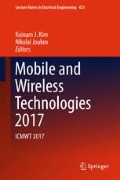Abstract
Most vendors of e-commerce applications deploy the cache memory to deliver the web objects to clients faster. However, they face many problems in dealing with the cache memory due to limited resources and dynamic access patterns. As a result, we need to efficiently manage the cache memory by evicting the unused data. The performance of cache manager depends upon the efficiency of delete determination. In this paper, we propose ERF, a cache eviction policy using natural exponential function on time with frequency in order to cope with dynamic nature of e-commerce business with limited memory. It sorts the caches in the order of result value which come from coordination between frequency and recency and evicts the caches according to it. We evaluate the performance of ERF by using the workload which reflects the real-world applications and compare it with conventional algorithms. By increasing the cache hit ratio with ERF, we can expect the decrease of copy and delete operations of cache with improving the overall system performance.
Access this chapter
Tax calculation will be finalised at checkout
Purchases are for personal use only
References
Website Magazine (n.d.). https://www.websitemagazine.com/blog/5-reasons-visitors-leave-your-website. Accessed 20 Feb 2017
Mano MM (2008) Computer System Architecture. Prentice-Hall of India, New Delhi
Podlipnig S, Böszörmenyi L (2003) A survey of Web cache replacement strategies. ACM Comput Surv 35(4):374–398
Einziger G, Friedman R (2014) TinyLFU: a highly efficient cache admission policy. In: 2014 22nd euromicro international conference on parallel, distributed, and network-based processing
Abrams M (1995) Caching proxies: limitations and potentials. Department of Computer Science, Virginia Polytechnic Institute and State University, Blacksburg, VA
Abrams M, Standridge CR (1996) Removal policies in network caches for World-Wide Web documents. In: Conference proceedings on applications, technologies, architectures, and protocols for computer communications - SIGCOMM 1996
Kharbutli M, Solihin Y (2008) Counter-based cache replacement and bypassing algorithms. IEEE Trans Comput 57:433–447
Wu C-J, Martonosi M (2011) Adaptive timekeeping replacement: fine-grained capacity management for shared CMP caches. ACM Trans Archit Code Optim 8:3
Qureshi MK, Jaleel A, Patt YN, Steely SC Jr, Emer J (2007) Adaptive insertion policies for high performance caching. In: Proceedings of the 35th international sympsium on computer architecture
Markov chain (04 March 2017). https://en.wikipedia.org/wiki/Markov_chain. Accessed 05 Mar 2017
Acknowledgement
This research was supported by the MISP(Ministry of Science, ICT & Future Planning), Korea, under the National Program for Excellence in SW) supervised by the IITP(Institute for Information & communications Technology Promotion) (2015-0-00908)
Author information
Authors and Affiliations
Corresponding author
Editor information
Editors and Affiliations
Rights and permissions
Copyright information
© 2018 Springer Science+Business Media Singapore
About this paper
Cite this paper
Lee, J.H., Kwon, S.J., Chung, TS. (2018). ERF: Efficient Cache Eviction Strategy for E-commerce Applications. In: Kim, K., Joukov, N. (eds) Mobile and Wireless Technologies 2017. ICMWT 2017. Lecture Notes in Electrical Engineering, vol 425. Springer, Singapore. https://doi.org/10.1007/978-981-10-5281-1_33
Download citation
DOI: https://doi.org/10.1007/978-981-10-5281-1_33
Published:
Publisher Name: Springer, Singapore
Print ISBN: 978-981-10-5280-4
Online ISBN: 978-981-10-5281-1
eBook Packages: EngineeringEngineering (R0)

